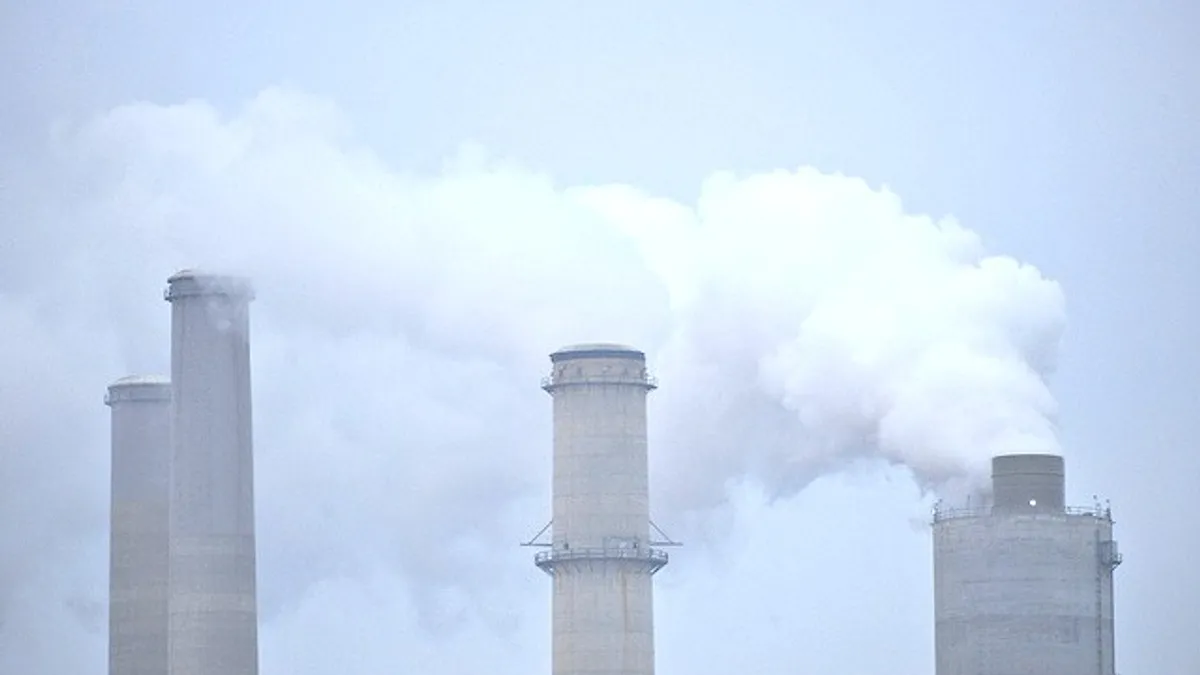Dive Brief:
- The Virginia State Air Pollution Control Board on Thursday approved draft regulations to cut carbon emissions from power plants and link the state with the Regional Greenhouse Gas Initiative (RGGI), a nine-state carbon cap-and-trade program.
- The board unanimously approved a draft plan floated last week by the Department of Environmental Quality that would set a cap on carbon emissions from power plants in 2020 and draw down that cap 30% by 2030. RGGI officials indicated the plan is consistent with the initiative's policy goals.
- The new regulations were developed by outgoing Gov. Terry McAuliffe (D), but only released after the victory of Democrat Ralph Northam in the gubernatorial election earlier this month. DEQ aims to have the regulations finalized and submitted to the air control board for ultimate approval next year.
Dive Insight:
Unlike most other states, Virginia has seen carbon emissions from its power plants rise in recent years. The DEQ estimates the state's plants emitted 34 million tons of carbon dioxide in 2016, up from 31 million in 2011, the Times-Dispatch notes.
The DEQ's new carbon reduction plan aims to reverse that trend, setting a cap of either 33 million or 34 million tons of carbon dioxide in 2020 that would decrease 3% per year for a decade. Regulators asked for comment on the initial cap for carbon emissions, which will be determined in the final regulation.
The regulatory package would make Virginia the tenth state to join RGGI, along with Connecticut, Delaware, Maine, Maryland, Massachusetts, New Hampshire, New York, Rhode Island and Vermont. Last week, RGGI officials indicated they had worked with the McAuliffe administration to craft the draft regulatory package, and said it is "indicative of [Virginia's] support of RGGI’s market-based approach to pricing emissions."
Approval of the draft regulatory package is a direct result of Northam's victory against Republican Ed Gillespie on Nov. 7. Northam is McAuliffe's lieutenant governor, and the Democratic administration released details on the plan only days after the election.
Though the vote was unanimous, the Times-Dispatch reports members of the air board debated whether to preserve a regulatory exemption for large industrial co-generation plants. That language was reportedly kept in the draft regulation, but it and other provisions could change as the DEQ responds to stakeholder comments in the coming months.
“If we don’t remove it, we’re essentially encouraging industrials to build new facilities like that,” air board member Samuel A. Bleicher said, according to the paper.
Most of the more than 30 power plants that would be covered by the Virginia climate regulation are owned by utility Dominion Energy. The company told the AP it has not yet reviewed the language but expects “to fully meet whatever regulatory requirements that result.”














